
Referencing Jewish thinkers Rabbi Abraham Joshua Heschel and Blu Greenberg, this article describes lighting the Shabbat candles as a transformative act that enables us to create temples in time, thus turning Shabbat on in the world. The author connects Shabbat to the Divine act of Creation, while also describing the value it adds in our modern, fast paced world.
Switching on Shabbat: Temples in Time
“The Sabbaths are our great cathedrals,” wrote Abraham Joshua Heschel in his book “The Sabbath” (1951). When the word “holiness” first appears in the Torah, it is not to pronounce the holiness of a mountain, a temple, or an altar, but the holiness of a day. In the absence of permanent structures during generations of Jewish exile and genocide, sacred time has become essential to the Jewish tradition. In Genesis 2:3 it is written, “And God blessed the seventh day and made it holy.”
The injunction to remember the Sabbath and keep it holy is one of the Ten Commandments. As Heschel observed, the Sabbath is a temple in time: a holiness built into every week. In the Jewish calendar, Sabbath begins at sunset on Friday and ends at sunset on Saturday. By lighting candles and saying the appropriate blessings over the wine and bread at sunset on Friday, Jews enter into this temple in time. Jews celebrate this gift of time with family and community.
In today’s world in which the rush of work and the pursuit of worldly gain can easily consume seven days a week, many Jews treasure this time to stop, to observe quiet and study, and to nurture the soul. People greet one another with the words “Shabbat Shalom” (“Sabbath peace”), for Shabbat is a day of peace in an often turbulent world.
As Blu Greenberg wrote in “How to Run An Orthodox Jewish Household “(1983), “Immediately after I light my candles, it is as if I flicked a switch that turned Shabbat on in the world, even though I know very well the world is not turned on to Shabbat. Remarkable as this experience is, even more remarkable is that it happens every seventh day of my life… [It is] a gift and a responsibility. Without it I could not live.”

